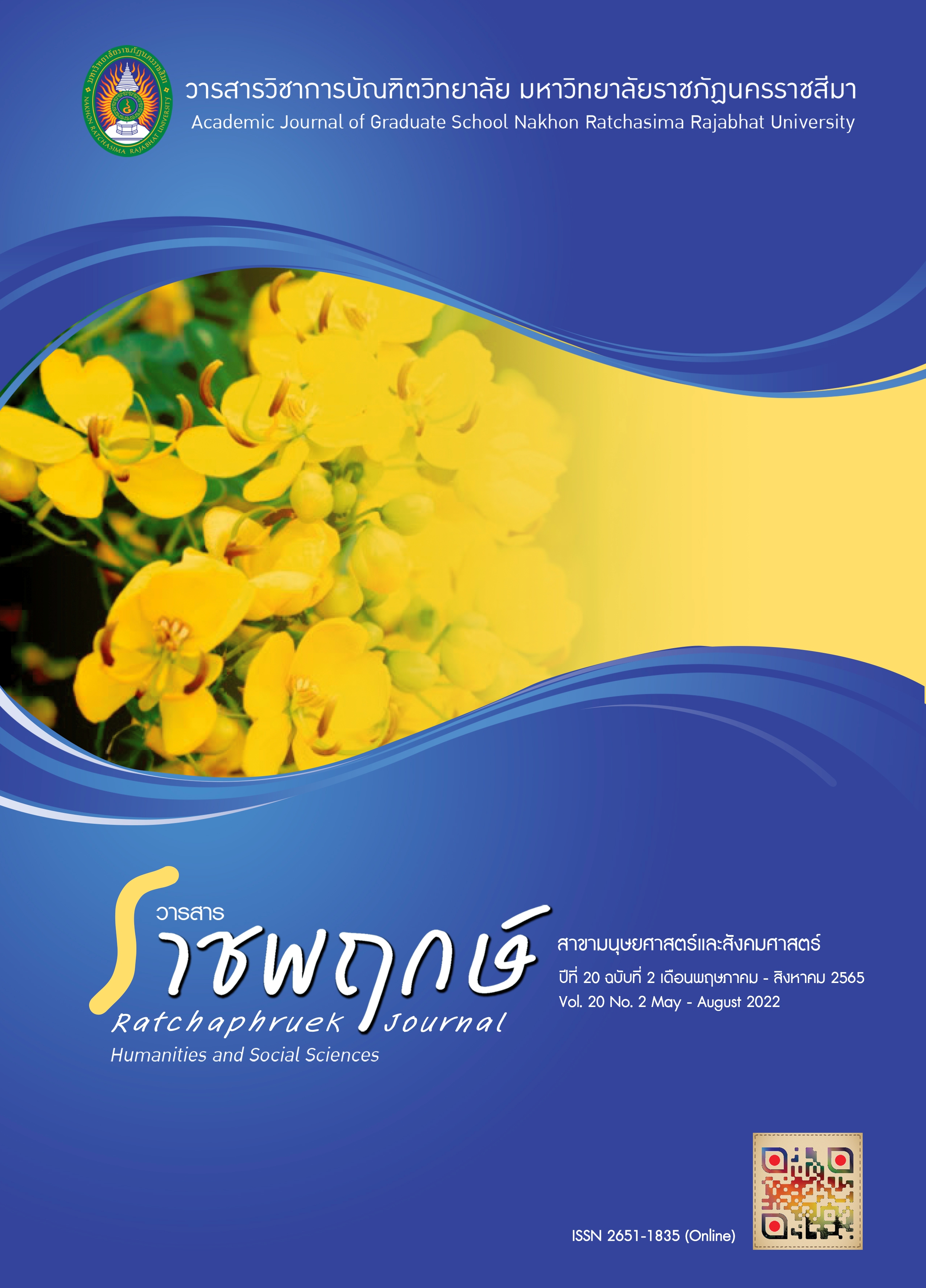The Applying of Information and Communication Technology Based on Teaching and Learning of Dramatic Arts in a VUCA World
Main Article Content
Abstract
Information and communication technologies can be used as a foundation for teaching and learning dramatic arts in the VUCA world. The purpose of this presentation is to introduce the notion of teaching and learning management under the contextual circumstances of VUCA world which is volatility, uncertainty, complexity, and ambiguity. It was affected by the COVID-19 situation on dramatic arts teaching and learning in VUCA settings which turns crisis to opportunity for value by professional learning community. To start with, teachers and students should adjust their mindset for changes to become a part of learning and personal development. To determine learning outcomes and how to achieve goals, they collaborate with the development plan (Unity). Moreover, lifelong learning path for individuals (Main) is determined. Technology in classroom learning is applied and managed (Contend). They also attend to learn new things with purpose and confidence with vision (Vision). Being brave, being aware of change, and self-efficacy are other features (Miracle). They also need to understand complexity to solve problems creatively with confidence (Assurance) in order to succeed (Mission) from learning, selective receiving, applying information technology, and communicating as standard for teaching and learning dramatic arts.
Article Details

This work is licensed under a Creative Commons Attribution-NonCommercial-NoDerivatives 4.0 International License.
References
กระทรวงศึกษาธิการ. (2551). หลักสูตรแกนกลางการศึกษาขั้นพื้นฐานพ.ศ. 2551 (พิมพ์ครั้งที่ 3).กรุงเทพฯ: โรงพิมพ์ชุมนุมสหกรณ์การเกษตรแห่งประเทศไทย.
คณะกรรมาธิการนานาชาติ. (2551). การเรียนรู้:ขุมทรัพย์ในตน (Learning: The Treasure within) (พิมพ์ครั้งที่ 2). กรุงเทพฯ: สำนักงานคณะกรรมการการศึกษาแห่งชาติ.
จุฬารัตน์ ธรรมประทีป. (2559). การพัฒนาความรู้ในเนื้อหาผนวกวิธีสอนและเทคโนโลยีในการสอนวิทยาศาสตร์. วารสารวิจัยและพัฒนาหลักสูตร, 6(2), น. 1-13.
ถนอมพร เลาหจรัสแสง. (2557). 21stcentury Skills for CMU Faculty Development ทักษะแห่งศตวรรษที่ 21 เพื่อการพัฒนาอาจารย์ของมหาวิทยาลัยเชียงใหม่. สืบค้นเมื่อ 20พฤศจิกายน 2564, จาก https://shorturl.asia/AtkI1
ธานินทร์ ทิมทอง. (2564). เวทีความร่วมมือแผนปฏิบัติการเพื่อการพัฒนาสังคมของประเทศไทย หัวข้อการศึกษาโดยคณะกรรมการปฏิรูปประเทศด้านการศึกษาและภาคีเครือข่าย. สืบค้นเมื่อ 21 พฤศจิกายน 2564, จาก https://www.youtube.com/
watch?v=JD1dPOMygQk
ประสาท เนืองเฉลิม. (2563). ครูในศตวรรษที่ 21. วารสารมนุษยศาสตร์และสังคมศาสตร์ มหาวิทยาลัยมหาสารคาม, 39(1), น. 15-24.
พระครูสุตวรธรรมกิจ และพระมหาพงศ์ทราทิพย์ สุธีโร. (2563). การพัฒนาครูไทยสู่ศตวรรษที่ 21. วารสารบัณฑิตสาเกตปริทรรศน์, 5(2), น. 19-30.
ไมตรี อินทร์ประสิทธิ์. (2563). EDUCA Zoom: ทำความเข้าใจการเรียนรู้แต่ละยุคสมัย การเรียนรู้แบบออนไลน์ (Online Learning) ที่แท้จริงคืออะไร. สืบค้นเมื่อ 19 พฤศจิกายน 2564,จาก https://www.youtube.com/watch?v=WGqZMG5gFaU.
วัฒนาพร ระงับทุกข์. (2563). สมรรถนะเด็กไทยในยุคโลกพลิกผัน (VUCA World). คุรุสภาวิทยาจารย์, 1(1), น. 8-11.
วิจารณ์ พานิช. (2555). วิถีสร้างการเรียนรู้เพื่อศิษย์ในศตวรรษที่ 21.กรุงเทพฯ: มูลนิธิสดศรี-สฤษดิ์วงศ์.
วิชัย วงษ์ใหญ่. (2557). สี่เสาหลักของการศึกษา. สืบค้นเมื่อ 21 พฤศจิกายน 2564, จากhttps://zhort.link/Dnq
ศราวุธ สุตะวงศ์. (2564). เวทีความร่วมมือแผนปฏิบัติการเพื่อการพัฒนาทางสังคมของประเทศไทย “การศึกษา”. สืบค้นเมื่อ 21 พฤศจิกายน 2564, จาก https://www.youtube.com/watch?v=JD1dPOMygQk
สำนักงานเลขาธิการสภาการศึกษา กระทรวงศึกษาธิการ. (2563). แผนการศึกษาแห่งชาติ พ.ศ. 2560-2579. กรุงเทพฯ: พริกหวานกราฟฟิค.
อานุภาพ เลขะกุล. (2564). ความปกติถัดไปอุดมศึกษา: ความท้าทาย.วารสารการศึกษาและนวัตกรรมการเรียนรู้, 1(2), น. 111-125.
ASEAN. (2020). ASEAN Declaration on Human Resources Development for the Changing World of Work and Its Roadmap. Retrieved December 7, 2022, from https://asean.org/wp-content/uploads/2021/01/ASEAN-Declaration-on-Human-Resources-Development-for-the-Changing-World-of-Work-and-Its.pdf
Baeten, M., and Simons, M. (2016). Innovative field experiences in teacher education: Student-teachers and mentors as partners in teaching. International Journal of Teaching and Learning in Higher Education. 28(1), pp. 38-51.
Battella for Kids. (2019). Framework for 21st Century Learning. Retrieved November 23, 2022, fromhttp://static.battelleforkids.org/documents/p21/P21_Framework_Brief.pdf
Carla, C. J. M., Millar, O. G. and John, F. M. (2018). Management Innovation in a VUCA World: Challenges and Recommendations. California Management Review, 61(1), pp. 5-14.
Cowell, P. (2021). COVID-19 has transformed education-here are the 5 innovations we should keep. Retrieved November 20, 2021, fromhttps://www.weforum.org/agenda/2021/02/covid-19-pandemic-higher-education-online-resources-students-lecturers-learning-teaching/
Dewey, J. (1998). Experience and Education: the 60th Anniversary Edition. Indianapolis: Kappa Delta Pi.
Giles, S. (2018). “How VUCA Is Reshaping The Business Environment, and What It Means For Innovation”. Retrieved November 16, 2021, from https://www.forbes.com/sites/sunniegiles/2018/05/09/how-vuca-is-reshaping-the-business-environment-and-what-it-means-for-innovation/?sh=20e4fd7deb8d
Greenstein, D. (2014). 4 trends that drive success in higher education. Retrieved November 12, 2021, fromhttps://www.weforum.org/agenda/2014/12/4-trends-that-drive-success-in-higher-education/
Kate, W. (2013). 21st-Century Teacher Education. Education Next; Cambride, 13(3). Retrieved December 7, 2022, from https://www.proquest.com/scholarly-journals/21st-century-teacher-education/docview/1355647534/se-2
Marion, S. (2021). The Opportunities and Challenges of Assessment in a Competency-Based Learning System. ใน การประชุมสัมมนาวิชาการ การวัด ประเมินผลและวิจัยสัมพันธ์แห่งประเทศไทย ครั้งที่ 29 การวัด ประเมิน และวิจัยการศึกษาเพื่อการพัฒนาสมรรถนะในโลกยุคเปลี่ยนผ่าน. สืบค้นเมื่อ 10 กุมภาพันธ์ 2565, จาก https://www.facebook.com/105474868491348/videos/1012110732728288
Martin, K. (2021). Evolving Education: Shifting to a Learner-Centered Paradigm: IM Press, LP.
Selinger, M. (2001). Learning information and communications technology skills and the subject context of the learning. Journal of Information Technology for Teacher Education. 1(1-2), pp. 142-156.
Selinger, M. (2006). CISCO C learning technology, learning, and culture: Issues of learning imperialism’ in technology-rich, global learning environment. London: University of London.


